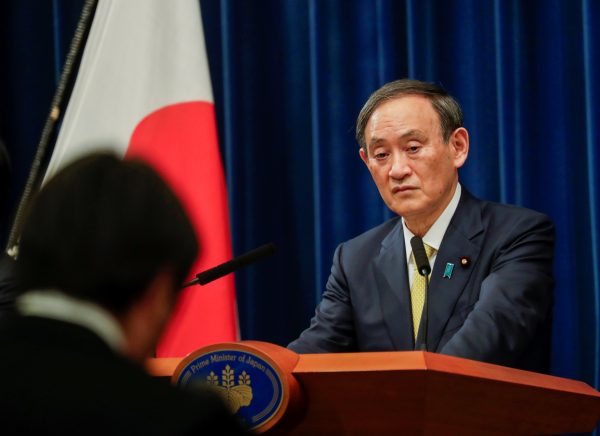In an unprecedented breach of convention, in October Suga rejected six scientists out of the 105 nominated by the SCJ. In the face of public protests, a petition with over 140,000 signatures and criticism from council members and other public figures, he only offered vague and inconsistent explanations for his decision. He repeated the statement that he would ‘refrain from answering as it is a personnel matter’.
In responding to questions, Suga was assisted by senior bureaucrats and Chief Cabinet Secretary Katsunobu Kato. Kato’s chief role is reportedly to maintain the administration’s approval rating, but he appears to have contributed to what the opposition calls an ‘incoherent’ response. No government representative has explained the root cause of the rejections despite reports that the six scientists were rejected because they had earlier criticised government policy under the Abe administration — specifically the 2013 state secrets law and the 2015 national security legislation.
The role of Deputy Chief Cabinet Secretary Kazuhiro Sugita appears to have been pivotal. He reportedly removed the scientists’ names from the list submitted to Suga for his approval, notifying him in advance that the six nominees would be excluded. The opposition has called for clarification of who was actually responsible for eliminating the names, with Suga appearing to have entrusted the appointments to Sugita.
Sugita had also reportedly intervened in the appointments process for a Council for Cultural Affairs subdivision during the Abe administration in 2016. Sugita told the former vice-minister of education that ‘it’s not good to appoint people who criticize the government’. A former National Police Agency bureaucrat, Sugita has been called the ‘shadow prime minister’ and one of the infamous ‘three phantoms’ who continue to roam the Prime Minister’s Office and manipulate Suga, the ‘puppet prime minister’.
The facts in the current case clearly suggest intervention in the council nomination process for political reasons. The outcome will intimidate Japanese scientists who might consider criticising government policies in the future, undermining academic freedom, the SJC’s independence and neutrality from government, as well as freedom of speech in Japan.
As chief cabinet secretary in the Abe administration, Suga’s authority in relation to personnel appointments had broad system-wide effects. Suga’s de facto authority over the Cabinet Bureau of Personnel Affairs meant the bureaucracy was under his control, and he became known for only allowing the appointments of compliant personnel and for firing those who were critical of the Abe administration. As a senior Japanese government official ruefully observed, ‘[promotion]…has turned into a race in which participants compete over how well they can serve the chief cabinet secretary’.
The Suga administration’s handling of the SCJ appointments also reflects a pattern that characterised his conduct as government spokesperson for the Abe administration. Instead of acknowledging issues that called for government transparency, he stonewalled the media at daily press conferences, obfuscated issues and failed to provide clear explanations for the successive political scandals that beset the Abe administration.
When Abe and those around him abused power for personal gain, it was Suga’s job to protect them through concealment and falsification. Not only did he lead efforts to put the Moritomo Gakuen scandal to rest, but he was criticised for his weak handling of allegations that Abe used publicly funded cherry blossom (sakura) viewing parties hosted by the Prime Minister for his own political benefit.
Suga claimed the government had not kept critical documents relating to the scandal because the information — a list of invitees for a cherry blossom viewing party — was ‘closely related to state secrets’. He also repeated false accounts to remain consistent with Abe.
Prosecutors are now questioning Abe’s former aides, including one of his taxpayer-funded secretaries, over allegations that his office illegally subsidised the cost of his supporters attending the 2018 sakura party dinner. The financial arrangements for the dinner may violate both the Political Funds Control Law and the Public Offices Election Law, and the controversy has undermined prospects for a Suga-led early general election. Suga has dismissed a request for the government to reopen the probe into the issue, although Abe has now agreed to cooperate with the investigation ‘with sincerity’ and is likely to be questioned by prosecutors soon.
The SCJ issue was responsible for the first hit to Suga’s approval rating following his election as Prime Minister in September. Over half of the respondents in an early November survey said they were dissatisfied with Suga’s explanation for the rejection of the six candidates, and in a later poll only 43 per cent approved of Suga’s ‘accountability’.
This series of accountability failures illustrates major shortfalls in Japan’s political system and current leadership. Of the three stages of government accountability — revealing information, engaging in public discussion and rectifying failures — Suga has failed to reach even the first.
Aurelia George Mulgan is Professor at the School of Humanities and Social Sciences, the University of New South Wales, Canberra.


Thanks for providing more context to Suga’s refusal to confirm the appointment of those 6 scientists. As I do not read Japanese I was not aware of the fact that some believe that Sugita is a ‘shadow prime minister’ and that there are ‘three phantoms’ in the government as well.
Given that Suga was Abe’s right hand man for many years it comes as no surprise that he intends to pursue his former boss’ policies. Also, that he is a master at the kind of obfuscation that Abe used to engage in much of the time. As Suga does not head up any faction within the LDP this continuity was probably the main reason why he was backed by the leaders of the party. If he does not do well, they will replace him after the next election in the coming months.